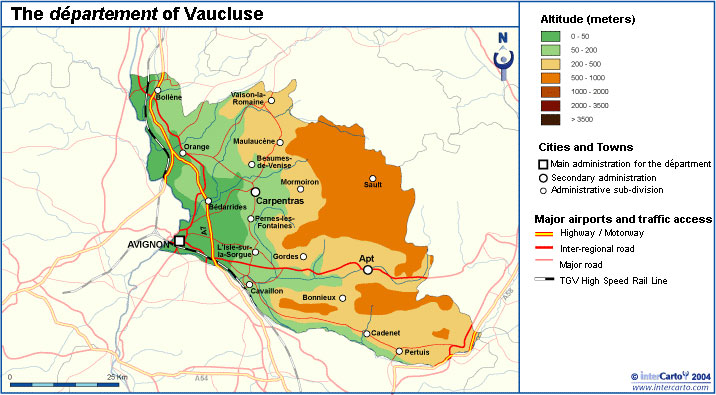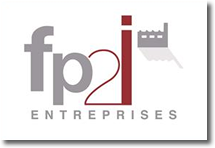The département of the Vaucluse is strategically located on a main transport route linking Spain and Italy. It also opens wide onto the entire Mediterranean region, including North Africa.
Avignon, with its 100 000 inhabitants, remains a “human-sized” city, but is surrounded by large urbanized areas:
- located at the heart of the vast consumption basin of Southern Europe, with 115 million customers,
- at the center of a big economic triangle: Lyon – Montpellier – Marseille,,
- 4 cities of more than 140 000 inhabitants within a 100 km radius with direct highway/motorway access: Montpellier, Nîmes, Aix-en-Provence, Marseille.
The Vaucluse enjoys a strategic geographical position and quality modern infrastructures:
A - ROAD
The Vaucluse département is at the heart of a major road network, with the intersection of highways A7 and A9 linking it to the entire European road network.
B - AIR
Air-travel is served by four airports: (Nîmes-Alès-Camargue-Cévennes, Avignon, Montpellier, Marseille-Provence (the second-biggest French air hub for freight)).
C - SEA
Close to France's biggest sea-port installation (94 million tonnes of freight shipped every year) and the country's main French fuel terminal: Marseille-Fos-sur-Mer.
D - RIVER
The Vaucluse is also linked to a major river transport network providing access along the Rhône River to the Fos-sur-Mer port installations from the river ports of Bollène, Mondragon and Avignon-Courtine.
E - RAIL
Passengers :
High-speed TGV rail transport allows train passengers to get to cities of major regional and national importance (Avignon-Paris: 2h40, Avignon-Lyon: 1h, Avignon-Marseille: 30 minutes...).
The advantage of inter-regional access
Avignon is located at the meeting point of :
- three départements : Vaucluse, Bouches-du-Rhône and Gard
- and two major regions : Provence-Alpes-Côte d'Azur and Languedoc- Roussillon.
La logistique, pôle d’excellence en Vaucluse
Alongside the food industry, the transport and logistics sector is one of the main industrial activities of the Vaucluse. This sector weights significantly in the area's economy, with 430 companies and close on 9 000 jobs (source: URSSAF - mars 07).
A source of skilled operators in the transport and logistics industry
The Vaucluse trains qualified personnel for this sector of activity, from basic vocational training to advanced degree levels. The CRET-LOG, a university-run management research agency specializing in logistics (Université de la Méditerranée) offers the country’s most comprehensive and diversified university training in logistics. More than 600 students benefit from this network of interbranch training skills, from entrance level studies to continuous training for experienced professionals.
The PRIDES PACA Logistique : is an organization of ligistics operators gathered within a regional cluster with the following aims :
- to network all the operators of the logistics industry,
- to support the development of projects that are concrete, innovative and mutually beneficial, helping to improve the competitiveness of the companies set up in the area.
This resource is available to each of the operators in the cluster: companies, personnel, research laboratories, schools and training centers.
The SCS (pôle de Solutions Communicantes Sécurisées = Secure Communications Solutions unit)is a structure set up to improve competitiveness at a worldwide level in order to develop new solutions based on the latest technology applied to logistics for flow management throughout the supply chain.
Optimal accessibility : "Travel away nearby! Choose the Vaucluse."
The food industry - main industrial sector of the Vaucluse
The food industry accounts for 25% of the jobs and 10% of the industrial turnover in the Vaucluse. The sector boasts 240 companies that employ 8 154 permanent personnel and report a EUR 1.5 billion turnover per year (2007).
Dynamic companies and worldwide leader in their field
Ducros-McCormick, Gyma, Fuchs, Groupe Soufflet, Grands Moulins de Paris, Neuhauser, Florette-Soleco, Agis, Liebig-Campbell, Les Délices du Luberon, Midi-Conserves (Maison Rivière), Raynal & Roquelaure, Faraud SA, Christian Potier, Louis Martin, Conserverie Davin, Conserverie Raynault, Cristaline, Schweppes, Naturex, Kerry, Rousselot…
A valuable natural resource : fruit and vegetables
The processing of fruit and vegetables is the mainstay of the Vaucluse food industry (25% of the companies), with 3 main categories: candied Provence cherries, processed tomato products and 4th range ready-to-use salads.
A variety of organizational units have been set up to support the competitiveness of the food industry :
- The European Fruit and Vegetable Innovation unit (pôle Européen d’Innovation Fruits et Légumes), whose objective is to double the consumption of fruit and vegetables in France, and to create at least 1 000 direct jobs in the fruit and vegetable industry, thereby stabilizing production and agricultural employment.
- The PASS unit, focused on characterizing and evaluating ingredients, scents and aromas for the food and cosmetics industries.
- The TRIMATEC unit, which works to improve industrial processes transferred from the fields of chemistry and separative physics into the field of industrial processing.
- The globe-spanning SCS unit (Secure Communications Solutions) accounts for41 000 jobs in the PACA region in the field of information technology and communications.
Optimal accessibility : "Traval away nearby! Choose the Vaucluse."
Cosmetics and natural scents - a flagship industry for the region
Thanks to the cultivation of the main varieties of PAMP flowers (perfume, aromatic and medicinal plants), the Provence-Alpes-Côte d’Azur (PACA) region has become one of the major hubs for the perfume and cosmetics industry:
- More than 350 companies in the cosmetics and perfume industry have set up in the area, and 96 of France’s 130 distilleries are based in the region.
- 70% of the world’s crop of industrial lavender is grown in the region.
About fifty companies active in the PAMP industry have set up units in the Vaucluse. The département includes a large proportion of the planted surfaces used for growing PAMP crops and hosts major companies dedicated to processing and distributing these products: Naturex, Aroma Zone, ADV Cosmétiques, Laboratoire Rosier Davenne, SICAF, Biolandes, France Aromatique, Laboratoire Carmain, Rousselot, Herbatech, Bionov, Scalime Nutrition, Bedouin SA, Herbissima, Le Secret Naturel, Ciel d'Azur, Chic et Nature, Quatressences, Algovital, Savonnerie des Dentelles...
The market sector of essential oils and organic extracts and aromas is growing rapidly:
- 3rd fastest growth in France, with a +16% increase in planted surfaces that are certified organic over the past 9 years,
- In the Vaucluse, 218 growers had obtained organic certification by 2006, with some 5 208 hectares planted with organic crops, and almost 65% of the Vaucluse agricultural production grown under quality or organic certification,
- The region ranks 1st in France in terms of the penetration of organic agriculture.
A particularly favorable socioeconomic environment :
- As a dynamic and high-performance region, PACA now has several R&D and technology transfer centers that serve the cosmetics industry: CRITT Chimie, CTCPA, INRA ...
- Avignon is at the heart of a network that delivers excellent results in the area of processing active plant-extracts thanks to a strong pool of skills in various technological fields: microwaves, ultrasound, supercritical fluids, chemical solvents …
- Three units have been set up to support the competitiveness of the companies working in this industry: Trimatec, Pôle PASS, PEIFL
- The PACA region has also birthed several interbranch organizations: COSMED, ONIPPAM, COSMEBIO, CRIEPPAM
The logistics potential is perfectly suited to the requirements of the cosmetology sector.
Optimal accessibility : "Travel away nearby! Choose the Vaucluse."
Provence opts for new energies
The PACA region (Provence-Alpes-Côte d'Azur) has made a priority of developing new forms of energy production and controlling energy consumption by investing 70 million euros over 4 years into this area. Currently, only 10% of the energy consumed by the region is produced within its boundaries. Thanks to its exceptional natural resources, to its economic capacity and to the unique opportunities that have been opened up by the ITER and GB2 (George Besse II) projects, the region intends to play a leading role on the international scene in terms on new energy technologies.
ITER and GB2
- ITER is a huge international research project that represents a total investment of EUR 10 billion. Its ambition is to develop the energy source of the future.
- The George Besse 2 project, based near the town of Bollène, is a new process for uranium enrichment that will consume 10 to 40 times less power than the current process.
Photovoltaics and Solar Thermal
- With 2 500 hours of sunshine per year (300 days), the region ranks as France’s main solar energy source.
- An exceptional potential: in 2007, 28% of the PV projects in PACA were set up in the Vaucluse.
- The “Renewable Energies Cheque”: PACA regional authorities contribute EUR 700 to solar thermal installations, and the Vaucluse adds a further EUR 350.
- Regional aid for photovoltaic power production ranges from EUR 0.5 to EUR 3 per Watt-peak.
- Regional authorities have set themselves the goal of creating a real photovoltaic industry as a matter of economic priority.
Wind power
- The region is France’s 3rd largest source of wind power: 120 days of wind per year, amounting to 1 day in 3.
- In Provence, the Mistral wind could supply approximately 500 MW per year. Currently, there are only 51 MW installed and plans for another 32 MW in the future.
Firewood
- PACA is the 3rd most wooded region in France.
- It is France’s 1st region for manufacturing light wood packaging.
- 700 000 metric tonnes of waste are produced by the wood industry, for a total 20 000 toe per year.
- In 2007, firewood was included in the Renewable Energies subsidized aid program.
Biomasse - Biogaz - Hydraulique
- Agriculture and the food industry provide an abundant supply of material to fuel biomass installations.
- The Rhône and Durance rivers have led the main operators to develop their presence in the Vaucluse: EDF, CNR (Compagnie Nationale du Rhône).
Biomass - Biogas - Hydraulic
- Organizations and agencies: Ademe PACA, Enerplan, CAPENERGIES skills hub, AERE, Parc Naturel Régional du Luberon (regional park administration), UDVN 84, Probois Ventoux, ...
- The companies: EOLE-RES, Ecostream, Fondasolutions (Schmees Bau GmbH), Tecsol solar technology, SolEnergie, Kaora, Mondragon Assembly, MégaSun, Heliowatt/Aerowatt, Tasol, Valfibois, Alternat'Style, Thermovolt, Lizard Energy, Ciel et Terre ...
Optimal accessibility : "Travel away nearby! Choose the Vaucluse."
Geographical map of the region


